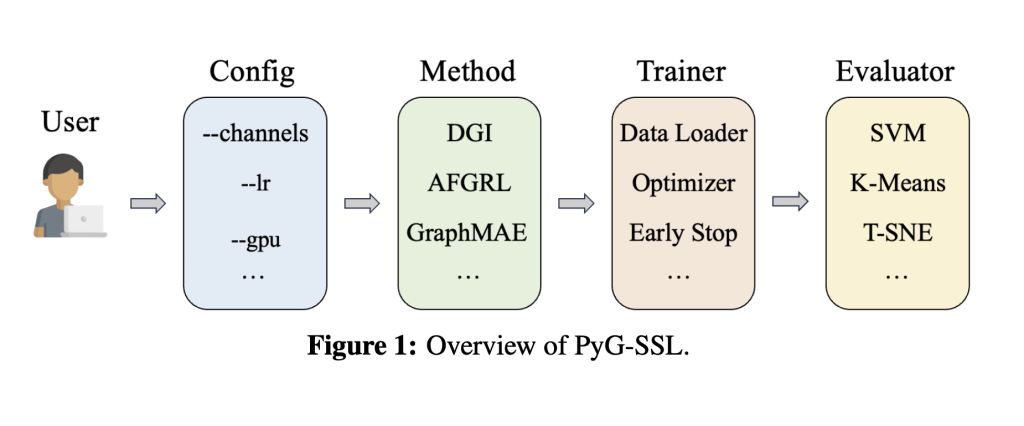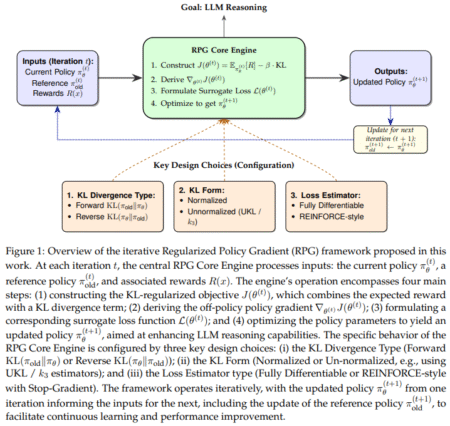

Complex domains like social media, molecular biology, and recommendation systems have graph-structured data that consists of nodes, edges, and their respective features. These nodes and edges do not have a structured relationship, so addressing them using graph neural networks (GNNs) is essential. However, GNNs rely on labeled data, which is difficult and expensive to obtain. Self-supervised Learning (SSL) is an evolving methodology that leverages unlabelled data by generating its supervisory signals. SSL for graphs comes with its own challenges, such as domain specificity, lack of modularity, and steep learning curve. Addressing these issues, a team of researchers from the University of Illinois Urbana-Champaign, Wayne State University, and Meta AI have developed PyG-SSL, an open-source toolkit designed to advance graph self-supervised learning.
Current Graph Self-Supervised Learning (GSSL) approaches primarily focus on pretext (self-generated) tasks, graph augmentation, and contrastive learning. Pretext includes node-level, edge-level, and graph-level tasks that help the model learn useful representations without needing labeled data. Their augmentation occurs by dropping, maskin,g or shuffling, improving the model’s robustness and generalizability. However, existing GSSL frameworks are designed for specific applications and require significant customization. Moreover, developing and testing new SSL methods is time-intensive and error-prone without a modular and extensible framework. Therefore, a new process is needed to address the fragmented nature of existing GSSL implementations and the absence of a unified toolkit that restricts standardization and benchmarking across various GSSL methods.
The proposed toolkit, PyG-SSL, standardizes the implementation and evaluation of graph SSL methods. The key features of PyG-SSL are:
- Comprehensive Support: This toolkit integrates multiple state-of-the-art methods for a unified framework, allowing researchers to select the most suitable method for their specific application.
- Modularity: PyG-SSL allows the creation of tailored solutions by mixing one or more techniques. Pipelines can also be customized without requiring extensive reconfiguration.
- Benchmarks and Datasets: Standard datasets and evaluation protocols are preloaded in this toolkit to allow researchers to benchmark their findings and ensure validation easily.
- Performance Optimization: PyG-SSL toolkit is designed to handle large datasets efficiently. It is optimized for fast training time and reduced computational requirements.
This toolkit has been rigorously tested across multiple datasets and SSL methods, demonstrating its effectiveness in standardizing and advancing graph SSL research. With reference implementations of a wide range of SSL methods, PyG-SSL ensures that the results are reproducible and comparable in experiments. Experimental results demonstrate that integrating PyG-SSL into existing GNN architectures improves their performance on downstream tasks by properly exploiting unlabeled data.
PyG-SSL marks a significant milestone in graph self-supervised learning, addressing long-standing challenges related to standardization, reproducibility, and accessibility. PyG-SSL gives the possibility to attain state-of-the-art results through its unified, modular, and extensible toolkit, easing the development of innovative graph SSL methods. PyG-SSL can play a pivotal role in advancing graph-based machine learning applications across diverse domains in this fast-evolving field.
Check out the Paper and GitHub Page. All credit for this research goes to the researchers of this project. Also, don’t forget to follow us on Twitter and join our Telegram Channel and LinkedIn Group. Don’t Forget to join our 60k+ ML SubReddit.
 FREE UPCOMING AI WEBINAR (JAN 15, 2025): Boost LLM Accuracy with Synthetic Data and Evaluation Intelligence–Join this webinar to gain actionable insights into boosting LLM model performance and accuracy while safeguarding data privacy.
FREE UPCOMING AI WEBINAR (JAN 15, 2025): Boost LLM Accuracy with Synthetic Data and Evaluation Intelligence–Join this webinar to gain actionable insights into boosting LLM model performance and accuracy while safeguarding data privacy.
The post PyG-SSL: An Open-Source Library for Graph Self-Supervised Learning and Compatible with Various Deep Learning and Scientific Computing Backends appeared first on MarkTechPost.
Source: Read MoreÂ




